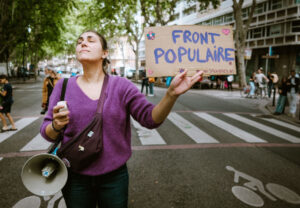Contrary to those punching the air and heaving enormous sighs of relief, it is difficult to draw any definitive conclusions about the recent legislative election in France. The ecstasy felt by many at seeing the National Rally (RN) fall far short of winning a majority had little to do with reality and much to do with wishful thinking and media hype.
After the rapidly cobbled together New Popular Front (NFP) alliance agreed to act tactically with the centrist Ensemble block, it was clear the RN would not win a majority in the National Assembly. What was always more likely is what has indeed happened: no single party or group of parties has managed to win enough seats to form a majority. Indeed, if anything, the real surprise here was the degree to which the logic of the cordon sanitaire still animates French politics. In spite of the significant differences between centrists and the Left block, the desire to block the RN was strong enough to result in cooperation between the first and second round of voting.
Given its importance in determining the results of these elections, it is worth exploring the merits of this anti-RN tactic. Most obviously, it appears to elevate republican institutions above party politics, implying that an RN victory would be against the spirit of the French republic and should be avoided at any cost. The practical consequence of this is to bring together political parties and groups whose programmes diverge widely and whose leaders excoriate each other on a daily basis. The achievement of the republican front thus comes at the cost of providing voters with a clear choice between rival political programmes. Moreover, it merely pushes into the post-election period the fundamental problem of how to constitute a government that is able to legislate and command the authority of the National Assembly. If the lesson of the election is that the RN cannot govern with a majority, it is also that no other political force can either.
There is another lesson of the elections, which is that we now have what we might call les deux Frances. The formation, over the past 30 years, of a solid hard-Right electorate is one of the important developments in French society. The strength of the NFP, however, and in particular the prominent role played by La France Insoumise within the NFP, is evidence of the formation of a very different electoral block on the Left. This one has its own codes and culture. It is also generative of its own language around progressive change. These electorates inhabit the same country but are worlds apart. Most significantly, neither of these two electorates comes close to a governing majority.
If the RN is able to achieve its long-term goal of the Union of the Rights (l’Union des Droites), then it could aspire to government — though the reaction to the centre-right leader Eric Ciotti’s decision to align with the RN suggests this union des droites is still some way off. On the Left, however, the route towards a majority is full of seemingly insurmountable obstacles. For starters, there are major divisions between the LFI and all other political forces on the Left. At the same time, the Left alliance would need to dismantle the centrist block and absorb significant parts of Macron’s electorate. Yet as things stand, there is evidence that the centrist bloc feels that things should go in the opposite direction: that they should divide the Left alliance by offering to govern with its more moderate elements — the Greens, the Socialists and Raphael Gluckmann’s movement — leaving the LFI on its own as a rump far left.
Celebrating the strong score of the NFP, Clémence Guetté, one of the leading figures of La France Insoumise summarised it thus: “Tonight we taste joy; tomorrow we govern.” The truth is rather different. Precisely by choosing to keep the RN out of power through tactical voting, NFP and Ensemble voters have created a situation where no party or coalition can form a government. For the moment, we know that prime minister Gabriel Attal offered his resignation, which the President rejected for now. We also know that the new National Assembly will sit from 18 July for two weeks, during which time it could vote on a motion to bring the government down.
Yet what happens next is less clear. Macron, after all, could reject this and keep his caretaker government in place at least until the beginning of October. However, without anything like a majority, any government that is formed will struggle to survive. For all of the relief felt across France, we should not forget that the RN was kept out of power by an alliance between two political forces who are unlikely to be able to govern together. Unless that changes, the survival of the republican front will come at the cost of being able to govern the country.
Disclaimer
Some of the posts we share are controversial and we do not necessarily agree with them in the whole extend. Sometimes we agree with the content or part of it but we do not agree with the narration or language. Nevertheless we find them somehow interesting, valuable and/or informative or we share them, because we strongly believe in freedom of speech, free press and journalism. We strongly encourage you to have a critical approach to all the content, do your own research and analysis to build your own opinion.
We would be glad to have your feedback.
Source: UnHerd Read the original article here: https://unherd.com/


